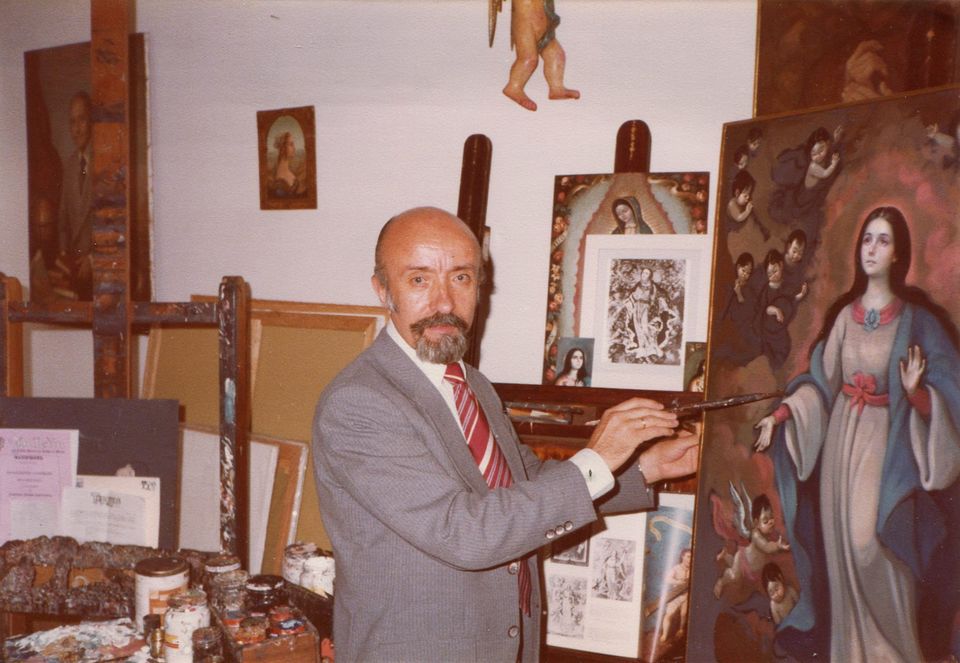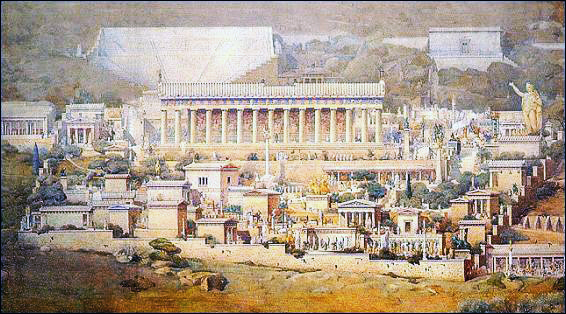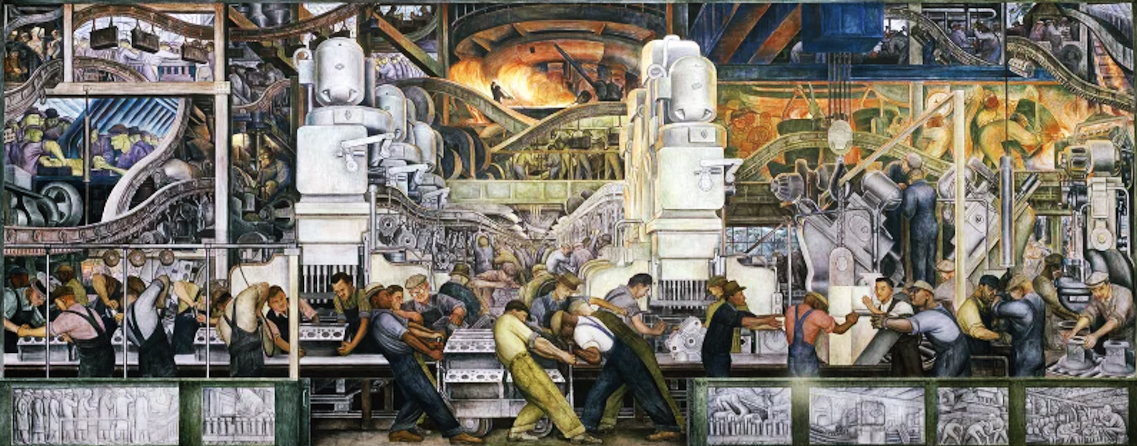Editor’s note: In April of last year I quoted the final page of The Lightning and the Sun, a 1958 book by Savitri Devi (the year I was born). Now I quote a substantial section of the entire chapter:
______ 卐 ______
 A short-sighted quest for indiscriminate individual enjoyment made him [the degenerate western male of our times] indifferent to the call to supermanhood. And he degraded himself ever more. Now, at the end of the Dark Age, the Edenic picture is completely reversed. Upon the surface of this unfortunate planet, which is loosing with alarming rapidity its once so broad and thick mantle of forests; of this unfortunate planet, where whole species of proud wild creatures—the aristocracy of the animal world—have already been or are being, with no less speed, wiped away—killed off to the last—one notices an increasingly obnoxious and steadily expanding swarm of dreary (when not positively ugly) vulgar, silly, worthless two-legged mammals. And the more worthless they are, the quicker they breed. The sickly and the dull have more children than the healthy and bright; the inferior races, and the people who have no race at all, definitely more than the hundred per cent Aryan; and the down-right rotten—afflicted both with hereditary diseases and racially undefinable blood—are, more often than not, terrifyingly fertile.
A short-sighted quest for indiscriminate individual enjoyment made him [the degenerate western male of our times] indifferent to the call to supermanhood. And he degraded himself ever more. Now, at the end of the Dark Age, the Edenic picture is completely reversed. Upon the surface of this unfortunate planet, which is loosing with alarming rapidity its once so broad and thick mantle of forests; of this unfortunate planet, where whole species of proud wild creatures—the aristocracy of the animal world—have already been or are being, with no less speed, wiped away—killed off to the last—one notices an increasingly obnoxious and steadily expanding swarm of dreary (when not positively ugly) vulgar, silly, worthless two-legged mammals. And the more worthless they are, the quicker they breed. The sickly and the dull have more children than the healthy and bright; the inferior races, and the people who have no race at all, definitely more than the hundred per cent Aryan; and the down-right rotten—afflicted both with hereditary diseases and racially undefinable blood—are, more often than not, terrifyingly fertile.
And everything is done to encourage that mad increase in number and that constant loss in quality. Everything is done to keep the sickly, the cripple, the freaks of nature, the unfit to work and unfit to live, from dying. One ‘prolongs’ as much as possible the lives of the incurable. One inflicts torture upon thousands of lovely, innocent, healthy animals, in the hope of discovering ‘new treatments’, so that deficient men, whom Nature has, anyhow, condemned to death, might last a few months—or a few weeks longer; so that they be patched up, or artificially given an illusion of vitality… while remaining a burden to the healthy. And that, whoever they may be; just because they are ‘human beings’.
Hospitals and asylums—bluntly described as such, or politely christened ‘homes’ are full of such dregs of humanity, old and young… while the healthy are (physically and morally) made unhealthy, through the conditions of life imposed upon them by a false civilisation: through joyless work and over-crowded houses lack of privacy; lack of leisure; through compulsory inoculations and cleverly advertised unnatural food; through nerve-wrecking mass-music, not to speak of a soul-killing, brain-softening mass-propaganda exalting unnatural values. Hospitals and asylums are, after slaughter-houses, one of the most depressing features of the advanced ‘Kali Yuga’ or Dark Age; the one which would automatically provoke the greatest disgust in the heart of a strong man of the beginning of this Age not to mention one out of the preceding ‘Dwapara Yuga’ and a fortiori out of a remoter Age, if such men could come back as they once were.
But why speak of hospitals and asylums? The streets are full of dregs of humanity, at least full of bastards and of sub-men. One only has to look at the faces one sees in the over-crowded buses, or in the cinemas and dancing-halls and cafes in large towns, nay even in small ones, even in the countryside, everywhere, save in those lands in which the dominant race is relatively pure. It is a pitiful sight; a pitiful world; a world up-side-down; a world in which the average cat or dog is, as such, immeasurably healthier, more beautiful—more perfect—than the average man or woman and a fortiori than the average post-1945 State ruler…
If only the ugly sub-men were capable of lofty thoughts—or simply of thought—that would be something! But they are not. And their leaders are worse than they, not better. True, they all speak of ‘free thinking’; speak of it, and write about it. They criticise their former friends (the Communists) for ‘killing individual thought’. Yet they are themselves the first ones to lack both freedom of judgement and individuality. They all have the same views; and the same ideal. Their views are those of the ruling press. Their ideal is to ‘get on in life’, i.e., to make money and to ‘be happy’, which means: to enjoy tasty food, fine clothing, lodgings provided with the latest commodities; and, in addition to that, as often as possible, a little drink, a little light music, a little sport, a little love-making.
Maybe, they call themselves Christians—or Hindus, or anything else. But whatever religion they might profess, their faith is skin-deep. Nothing, absolutely nothing more-than-personal—and, a fortiori, more-than-human—interests them. The one thing they all pray for, when they pray at all, is ‘peace’; not the unassailable, inner peace of the Best (of which they have not the foggiest experience), but peace in the sense of absence of war; the indefinite prolongation of a ‘status quo’ which allows them to think of to-morrow’s little pleasure without the fear of to-day’s deadly danger; peace, thanks to which they will, undisturbed—so they hope—be able to go on rotting in the midst of that increasing comfort, which technical progress secures them; peace, thanks to which they expect to remain (or gradually to become) happy—in the manner pigs are happy, when they have plenty to eat and clean straw to lie upon.
Accelerated technical progress is, along with accelerated human degeneracy, an all-important feature of the advanced Dark Age.
It is—or seems to be—the ‘triumph of man’ over Nature. And it is interpreted and exalted as such by the sub-men, all the more proud of it that they have nothing else—no real, living culture; no disinterested work or knowledge-to be proud of. It is—or seems to be—the ‘proof’ of man’s superiority over all other sentient beings; the ‘proof’ of his superiority en bloc, regardless of race, for… a Negro can drive a motorcar, can’t he?
And there are very clever Jewish doctors. It forwards or strengthens the age-old superstition of ‘man’, which lies at the root of all decay. It is, or seems to be, the way to universal ‘happiness’; the ideal of those increasing millions—and soon, milliards—who have no ideal. In fact, it helps the ruling powers of the Dark Age, the skilful agents of the forces of disintegration, to keep the millions under their control. For, paradoxical as this may sound, masses who can read and write are easier to enslave than masses who cannot, and nothing is so easy to subdue and to keep down as masses who consider their wireless and television sets and cinema shows as indispensable necessities of life. (The modern men ‘against Time’ know that, as well as the men ‘in Time’. Only they do not dispose of the inexhaustible financial resources of the latter.)
Technical progress, in all fields in which it does not automatically imply cruelty towards man or beast (or plant) [1], is not a bad thing in itself. Actually, it is not it that makes the Dark Age.
What makes the Dark Age is the fall of all but an extreme minority of men to the level of a brainless (and heartless) herd, and, at the same time, their endless increase in number. And technical progress is a curse only inasmuch as it is the most powerful instrument in the hands of all those who, directly or indirectly, encourage that indiscriminate increase and, consequently, forward that herd-mentality (even if they do not explicitly intend to); in the hands of the doctors who keep the weak and deficient and mongrels alive, and do nothing to prevent further such ones from being born: in the hands of the politicians ‘in Time’ who, precisely because they all share—like the doctors—the age-old superstition of ‘man’ and of man’s individual ‘happiness’ at any cost, are opposed to any systematic selection in view of the survival and welfare of the healthiest, let alone to systematic racial selection also, in view of the survival and rule of an all-round biological human aristocracy.
As I said above, technical progress and its wonders could just as easily be put to the service of a decidedly ‘life-centred’ philosophy ‘against Time’; of an aristocratic doctrine of personal and racial quality, such as National Socialism, if only the exponents of such a doctrine could maintain themselves in power in this advanced Age of Gloom—which they cannot.
The reason why they cannot is not that there exist electric trains and electric irons, radios and television sets, aeroplanes and washing machines and ‘electronic brains’ and all manner of major and minor commodities, products of technical skill, but that the overwhelming majority of mankind in this Age—the more and more numerous and duller and duller herd of all races, in process of general bastardisation—is against any and every aristocratic wisdom. The reason is that the millions and millions—soon milliards—of sub-men feel themselves threatened in their dream of pig-like ‘happiness’, nay, in their no less pig-like existence, by whoever embodies such a wisdom ‘against Time’. The reason is that the increasingly powerful agents of the death-forces, natural leaders of this Age, use radio, cinema, television, and all technical means that money can secure, to excite the unthinking herd against the Best, while doing everything they cart, through the advertisement of more and more wonderful commodities, to keep the average man’s slumbering mind away from higher things—away from every aspiration ‘against Time’; away from every aggressive criticism of the fundamental Dark Age dogmas and, in general, away from all impersonal problems… until its slumber ends in the definitive sleep of death.
It is not—surely not!—technical progress as such which so deeply shocks Kalki’s future compagnons at arms (or the fathers of such ones), those natural aristocrats of the youngest human race, whom I have described as ‘the Best’. It is the glaring disparity between the perfection of modern technical achievements considered as ‘means’ and the worthlessness of the ends to the service of which they are put; it is the contrast between that wonderful Aryan intelligence, which stands and shines behind practically every discovery of modern science, every invention of modern technique, and the steadily increasing degeneracy of the sub-human multitudes who enjoy the products of its creative ingenuity in daily life, as a matter of course, nay, who, through their misuse of them, are sinking lower and lower into that brainless and soulless ‘happiness’—I repeat: that pig-like ‘happiness’—which is the ideal of our times.
That ideal is the one forwarded, under one form or another, more and more unmistakably in the course of centuries, by all typical Dark Age leaders ‘in Time’, in particular, by that most efficient of all agents of the Dark Powers during the last two thousand four hundred years (at least) and specially during the last three or four hundred years: the international Jew. The advanced Dark Age of this present Time-cycle is the reign of the Jew—of the negative element; of the reverser of eternal values for the sake of ‘human’ ones, and, finally, for that of his own, selfish interests; the reign of the ‘destroyer of culture’, as Adolf Hitler so rightly pointed out; of the age-old ‘ferment of disintegration’. It is natural that ‘ferments of disintegration’ should become more and more active—more and more alive—as a Time-cycle nears its end…
They, the Jews, have preached meekness and forgiveness and pacifism (to all, save to their own people) in order to rob the young, warlike Aryan race of its stamina; in order to kill its healthy pride. They are, now more feverishly than ever, encouraging its adolescents to make fun of ‘Nazi prejudices’, to despise purity of blood, and to marry outside their race (if thus be the impulse of ‘individual love’)—so that the race may disappear; encouraging them into perdition, both through the old superstition of ‘man’ under its various modern forms, and through the whole atmosphere of subtle corruption in which the post-1945 world is literally soaking.
They must win—and they shall win—for the time being. Otherwise, it would not yet be the End. They must—and shall—see their dream—their immemorial dream of easy domination over a peaceable, ‘happy’ hotch-potch of bastardised millions and ever more millions, that their long-drawn disintegrating action has rendered even more contemptible than they—at a hair’s breadth from its complete materialisation. Otherwise, the measure of iniquity—the measure of untruth—would not be full. And it would not yet be time for ‘Kalki’—the Avenger—to come…
It is impossible to say ‘where’ He will appear…
According to the laws of development in Time which are those of the logic of history, Kalki, the Avenger, the final Redeemer, can only belong to the youngest race of our Time-cycle: the Aryan…
Will He be none other than He whom I have described as the One-before-the-last Man ‘against Time’—Adolf Hitler—returning with more-than-human power? There is no reason why this should not be, provided the inspired Leader still be alive, and provided the world becomes, within his life-time, ripe for the great End (which would in no way be a wonder, at the rate decay has set in everywhere, after 1945). The terrible experience of defeat through treason, and the sight of the systematic degradation of his people through far subtler and deadlier means than the ridiculous ‘de-nazification’ rules and regulations, would probably be enough to rouse the Führer’s ‘Lightning’ qualities until they balance in him the ‘Sun’ ones and make him a new man—infinitely more merciless than he was in his first career…
And ‘Kalki’ will be nearer to and more intimately connected with the latest great Man ‘against Time’, Adolf Hitler, than with any of the many former ones. For He—the last One—is, as I said in the beginning of this study, none other than the One of Whom the Führer spoke when, with that unfailing cosmic intuition that raises him so high above the cleverest of Dark Age politicians, he told Hans Grimm, in 1928: ‘I know that Somebody must come forth and meet our situation. I have sought him. I have found him nowhere; and therefore I have taken upon myself to do the preparatory work, only the most urgent preparatory work. For that much I know: I am not He. And I know also what is lacking in me’.
He is that One. And He will, in the midst of the most hopeless circumstances, continue the old—the perennial—Struggle against the downward stream of Time—the Struggle which the disaster of 1945 has apparently, but only apparently, interrupted—and bring it to a victorious end for a few myriads of years; make Adolf Hitler’s dream, through means that were yet unthinkable during (or before) the Second World war, a glaring reality for a few myriads of years.
The means cannot be foretold, for things will have changed, by then. Things are changing—and the science of war, progressing—every day. One point is, however, as a main feature of every recurring ‘great End’, beyond doubt: ‘Kalki’ will act with unprecedented ruthlessness. Contrarily to Adolf Hitler, He will spare not a single one of the enemies of the divine Cause: not a single one of its outspoken opponents but also not a single one of the luke-warm, of the opportunists, of the ideologically heretical, of the racially bastardised, of the unhealthy, of the hesitating, of the all-too-human; not a single one of those who, in body or in character or mind, bear the stamp of the fallen Ages.
As I said before, His companions at arms will be the last National Socialists; the men of iron who will have victoriously stood the test of persecution and, what is more, the test of complete isolation in the midst of a dreary, indifferent world, in which they have no place; who are facing that world and defying it through every gesture, every hint—every silence—of theirs and, more and more (in the case of the younger ones,) without even the personal memory of Adolf Hitler’s great days to sustain them; those I have called ‘gods on earth’ and parents of such ones.
They are the ones who will, one day, make good for all that which men ‘against Time’ have suffered in the course of history, like they themselves, for the sake of eternal truth: the avenging Comrades whom the Five Thousand of Verden called in vain within their hearts at the minute of death, upon the bank of the Aller River, red with blood; those whom the millions of 1945—the dying; the tortured; and the desperate survivors—called in vain; those whom all the vanquished fighters ‘against Time’ called in vain, in every phase of the great cosmic Struggle without beginning, against the Forces of disintegration, co-eternal with the Forces of Life.
They are the bridge to supermanhood, of which Nietzsche has spoken; the ‘last Battalion’ in which Adolf Hitler has put his confidence. Kalki will lead them, through the flames of the great End, into the sunshine of the new Golden Age…
We like to hope that the memory of the One-before-the-last and most heroic of all our Men ‘against Time’—Adolf Hitler—will survive, at least in songs and symbols, in that long Age of earthly Perfection which ‘Kalki’, the last One, is to open. We like to hope that the Lords of the new Time-cycle, men of his own blood and faith, will render him divine honours, through rites full of meaning and full of potency, in the cool shade of the endless re-grown forests, on the beaches, or upon inviolate mountain-peaks, facing the rising Sun.
But even if it be not so, still he will, like all his divine predecessors, live, throughout the ages in the faithful consciousness of the Universe, the life-rhythm of which he symbolises. Still the long and more and more intense and finally almost desperate aspiration ‘against Time’, which characterises every recurring Time-cycle as soon as decay has set in obviously enough to be felt, will be, every time, a new expression of that self-same yearning after manifested Perfection for the sake of which he fought and lost; a new, long-drawn cosmic outcry, proclaiming that he was right in spite of all.
And still every further Golden Age to come—every successive Dawn of Creation—will be the living materialisation of his highest dream; a further hymn of glory, proclaiming, every time for myriads of years, that he—He—has once more won.
____________
[1] Destruction of forests, for instance.
 Editor’s note: This is so true that it reminds me of yesterday’s post on this site, in which we saw how a scholar well versed in NS fails to cross the axiological river. The greatness of the NS men is noticeable in that in the last century Himmler’s select group had already crossed it. And the main shortcoming of white nationalism on the other side of the Atlantic, eighty years later, is that they continue to resist crossing it because of Christian ethics.
Editor’s note: This is so true that it reminds me of yesterday’s post on this site, in which we saw how a scholar well versed in NS fails to cross the axiological river. The greatness of the NS men is noticeable in that in the last century Himmler’s select group had already crossed it. And the main shortcoming of white nationalism on the other side of the Atlantic, eighty years later, is that they continue to resist crossing it because of Christian ethics.








